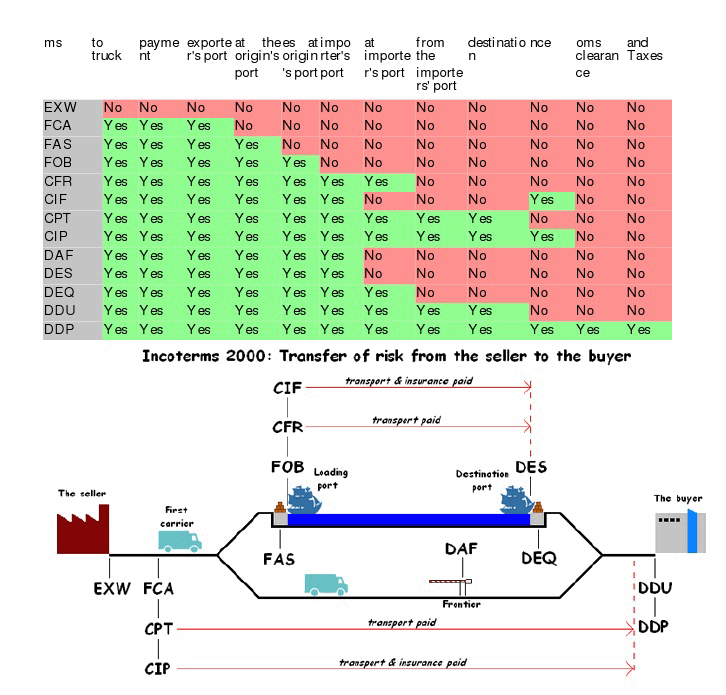As of January 01, 2011 the eighth edition, IncoTerms 2010[1], have effect. The changes therein affect this section in that all of the following five terms are obsolete and replaced with these three: DAT (Delivered at Terminal), DAP (Delivered at Place), and DDP (Delivered Duty Paid). The new terms apply to all modes of transport.
This term can be used when the goods are transported by rail and road. The seller pays for transportation to the named place of delivery at the frontier. The buyer arranges for customs clearance and pays for transportation from the frontier to his factory. The passing of risk occurs at the frontier.
Where goods are delivered ex ship, the passing of risk does not occur until the ship has arrived at the named port of destination and the goods made available for unloading to the buyer. The seller pays the same freight and insurance costs as he would under a CIF arrangement. Unlike CFR and CIF terms, the seller has agreed to bear not just cost, but also Risk and Title up to the arrival of the vessel at the named port. Costs for unloading the goods and any duties, taxes, etc… are for the Buyer. A commonly used term in shipping bulk commodities, such as coal, grain, dry chemicals and where the seller either owns or has chartered their own vessel.
This term means that the seller delivers the goods to the buyer to the named place of destination in the contract of sale. The goods are not cleared for import or unloaded from any form of transport at the place of destination. The buyer is responsible for the costs and risks for the unloading, duty and any subsequent delivery beyond the place of destination.
However, if the buyer wishes the seller to bear cost and risks associated with the import clearance, duty, unloading and subsequent delivery beyond the place of destination, then this all needs to be explicitly agreed upon in the contract of sale.
This term means that the seller pays for all transportation costs and bears all risk until the goods have been delivered and pays the duty. Also used interchangeably with the term “Free Domicile”. The most comprehensive term for the buyer. In most of the importing countries, taxes such as (but not limited to) VAT and excises should not be considered prepaid being handled as a “refundable” tax. Therefore VAT and excises usually are not representing a direct cost for the importer since they will be recovered against the sales on the local (domestic) market.



